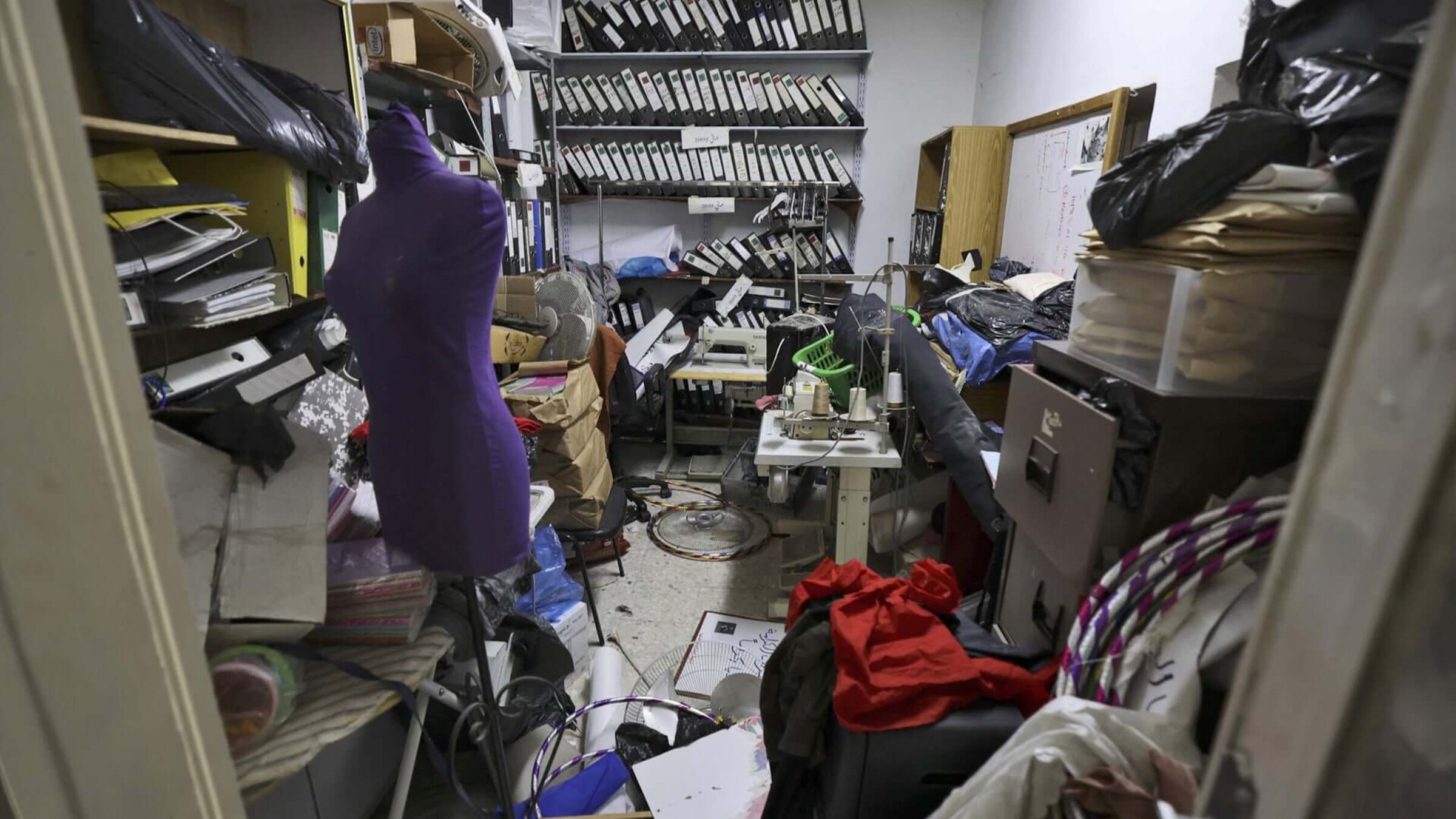Israel is criminalizing Palestinian human rights defenders. American Jews must push the US to intervene
Israel’s raid on seven Palestinian human rights NGOs is not a sign of a healthy democracy

The premises of the Palestinian NGO Union of Palestinian Women’s Committees in the West Bank city of Ramallah, after it was raided by Israeli forces on August 18, 2022. Photo by Abbas Momani/AFP
The Israeli military raided the offices of seven Palestinian civil society organizations on Aug. 18. They confiscated computers and printers, welded doors shut and pasted military orders demanding the organizations cease their operations. It was a moment that made those of us who care about human rights in Israel and the occupied Palestinian territories stop in our tracks. The Israeli government is now shutting down some of the most prominent human rights organizations in Palestinian civil society.
This is, simply put, not what democracies do.
Last October, Israel’s Defense Ministry alleged that six of these Palestinian groups were connected to the Popular Front for the Liberation of Palestine (PFLP), a far-left Palestinian political party with a militant armed wing, and designated them “terror organizations.” But, so far, the evidence the government has presented has failed to compel both Israel’s closest European allies and the U.S.’s own Central Intelligence Agency.
Still, the situation is likely to escalate further. After the raid, the Shin Bet, Israel’s internal security service, threatened the leaders of two of the organizations, saying that if they didn’t cease their operations they would “pay the price.” It is time for the vast majority of American Jews who care about Israel, Israeli democracy and the human rights of Palestinians living in the the West Bank and Gaza to send a clear message to our own U.S. government: Israel is our beloved friend, but friends tell the truth, even when the truth is hard to hear.
And the truth is, Israel is not acting like the “only democracy in the Middle East” it declares itself to be. American Jews should urge our leaders to tell Israel: Cease and desist from persecuting human rights defenders — their work is critical to your democracy.
The last decade has shown us that intervention by American officials can shift the calculus around the Israeli government’s approach to civil society and human rights organizations in particular.
Back in 2010, just a few months after I began my job as CEO of the New Israel Fund — an organization that protects and advances democracy and equality in Israel — a far-right group closely aligned with the Netanyahu government launched a public assault on human rights supporters and organizations, directly targeting NIF. The Israeli government attacked NIF and its grantees for pulling back the curtain on human rights abuses that happen every day in the West Bank, much like it is doing now with these Palestinian organizations. The strategy was clear then as it is now: Demonize all those who stand up for the human rights of Palestinians by smearing them as “terrorists,” and construct a conspiracy to undermine them.
Right-wing politicians in the Knesset have worked to formalize this strategy in legislation. In 2011, Knesset members proposed laws that would subject human rights organizations to official parliamentary panels of inquiry and another bill that would strip them of tax-exempt status. Those measures failed, but another one succeeded: The so-called “NGO Law” passed in 2016, singling out NGOs that receive the majority of their funding from foreign state bodies — funds often designated for human rights work — for onerous reporting requirements.
These requirements involved declaring their foreign funding in any publication, media appearance, or event. According to reporting at the time, of 27 organizations believed to be affected by the law, 25 were found to be left-wing or human rights groups (many of which were NIF grantees). It was a law aimed at chilling and limiting speech that is critical of Israeli government policies; any progressive American observer would immediately call it out as having no place in a democracy.
In this case, American intervention made a difference. Then-Secretary of State Hillary Clinton told a closed session at the Saban Forum in 2011 that a democratic Israel was not one that passed laws aimed at the financial suffocation of peace and human rights organizations. That, she implied, is something democracies don’t do. Other officials in the Obama administration were clear that they similarly disapproved of such legislation. When the NGO Law passed in 2016, a U.S. State Department spokesman said the law poses a danger to a “free and functioning civil society.”
These American stances were encouraging for Israel’s human rights community and they helped Israeli lawmakers remember that Israel’s most critical ally was watching. It is therefore noteworthy that, while the NGO Law remains on Israel’s lawbooks, it was reported in November of 2020 that Israel has done very little to enforce it.
When Israel’s Ministry of Defense declared these six Palestinian NGOs “terrorist groups,” in October 2021, it seemed like this playbook was being consulted once again. It bears repeating that Israel has presented no substantive evidence that justifies the designation of these organizations as “terrorists.” None of Israel’s friends have been convinced by the so-called “evidence” Israel has shared with them that the Palestinian human rights organizations have done anything wrong.
Instead, it seems that Israel wants these pesky human rights organizations, their reportage and criticisms to disappear. Instead of genuinely addressing the human rights violations these groups uncover (and there are many after 55 years of Israeli military occupation), the Israeli government is trying to shut them up by shutting them down.
This should not and does not sit well with those who value democracy and oppose autocracy. Of the recent raids, the EU has said it is “deeply concerned” and emphasized that “a free and strong civil society is indispensable for promoting democratic values and for a two-state solution” and reaffirmed its commitment to “stand firm with non-governmental organizations to uphold the right to freedom of expression and association in the occupied Palestinian territories.”
Israel’s pre-eminent human rights lawyer Michael Sfard says that the real reason for Israel criminalizing these organizations may be less about terrorism, and more about Israel’s political fight against the Boycott Divestment Sanctions (BDS) movement and the International Criminal Court’s investigation of Israel. Some of the organizations Israel shut down have indeed promoted BDS or the ICC investigations — something the Israeli government considers to be a Palestinian-led effort to delegitimize Israel. But such political issues have nothing to do with terrorism. Invoking counter-terrorism legislation to thwart non-violent political dissent is the undemocratic act of a state afraid of the criticism leveled against it.
The right move is always to stand with human rights defenders, even and especially when it’s hard. Americans who support democracy and human rights – including American Jews – do not stand idly when our own government ignores our country’s democratic values. We cannot do so now when a U.S. ally, even when that ally is Israel, acts in violation of the core principles we hold so dear.
It is the job of human rights organizations to hold a mirror up to their own societies in the hopes that those societies will work to be better. We need them to be unafraid and unabashed, willing to hold leaders to account, to say what may be politically unpopular and demand solutions that work for everyone. Without their criticism — and without the governments they criticize respecting that criticism — democracy falls apart and we are all susceptible to abuse. This is how human rights defenders protect us all.
American Jews — and the Biden administration — must stand with them.
To contact the author, email [email protected].
























